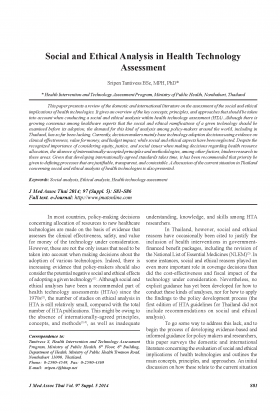This website uses cookies so that we can provide you with the best user experience possible. Cookie information is stored in your browser and performs functions such as recognising you when you return to our website and helping our team to understand which sections of the website you find most interesting and useful.
Social and Ethical Analysis in Health Technology Assessment (2014)

รายละเอียดเพิ่มเติม
Sripen Tantivess BSc, MPH, PhD*
* Health Intervention and Technology Assessment Program, Ministry of Public Health, Nonthaburi, Thailand
This paper presents a review of the domestic and international literature on the assessment of the social and ethical implications of health technologies. It gives an overview of the key concepts, principles, and approaches that should be taken into account when conducting a social and ethical analysis within health technology assessment (HTA). Although there is growing consensus among healthcare experts that the social and ethical ramifications of a given technology should be examined before its adoption, the demand for this kind of analysis among policy-makers around the world, including in Thailand, has so far been lacking. Currently, decision-makers mainly base technology adoption decisions using evidence on clinical effectiveness, value for money, and budget impact, while social and ethical aspects have been neglected. Despite the recognized importance of considering equity, justice, and social issues when making decisions regarding health resource allocation, the absence of internationally-accepted principles and methodologies, among other factors, hinders research in these areas. Given that developing internationally agreed standards takes time, it has been recommended that priority be given to defining processes that are justifiable, transparent, and contestable. A discussion of the current situation in Thailand concerning social and ethical analysis of health technologies is also presented.
J Med Assoc Thai 2014; 97 (Suppl. 5): S81-S86
Full text. e-Journal: http://www.jmatonline.com




